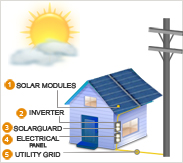
Solar panels are made up of photovoltaic cells which convert natural sunlight into direct current (DC) electricity. These solar panels are installed on your roof and the photons (sunlight particles) are converted into electrons of DC. The electricity flows from the solar panel into an inverter and other electric safety devices where the DC power is converted to alternating current (AC) power. The AC power is the equivalent of standard household electricity used for your television, computer, toaster, and other appliances. The AC power travels from the inverter to the electric panel and becomes available to service all your electrical needs.
An energy meter continually keeps track of your electric supply; when your solar system produces more energy than you need, the unused energy goes back into the electrical grid through the meter. During nights and cloudy days, power is still available and you will consume electricity as usual. Your utility company will bill you for the consumption and will provide you with dollar credit for any excess energy.
California offers several rebates and tax credits for home and business owners that choose to install solar electric and solar thermal systems. Your eligibility to qualify for these savings depends on a number of things such as your location, specific energy usage, state regulations and more. Let one of our expert installers provide you with a free solar evaluation for your home or facility by filling out our contact form. We will combine your regional data with solar rebates and incentives to maximize savings off your electric bill by using clean, renewable energy.
Residential Questions and Answers
There are several factors that will determine whether or not your home is right for solar power. One of the most important factors is the orientation of your roof; this will determine the amount of sun exposure you will get. Getting optimum solar energy production is will only occur with a good south-facing roof. Another important factor is the quality of your roof. Your roof will need to be carefully analyzed by our installers since its structural integrity and can affect the installation process. A residential solar system typically requires about 3 to 6 kW, which needs 300 to 600 square feet of space, depending on your electrical needs.
The best type of roof for a solar project is one that isn’t too steep and provides sufficient unobstructed space for the solar panels. Solar electric systems are installed well on most roofs except slate and clay tile roofs. Wood shake roofs, flat roofs, and concrete roofs are not ideal for solar installation and can make it more expensive.
Since residential solar power is produced naturally, the dust and debris that accumulates on the solar panels will not impact the solar production. Your solar panels will continue to produce energy near optimum as a result of wind and rainfall. It is recommended that you clean your panels only if you notice a dramatic drop in electricity production.
Residential solar power systems are designed simple and without moving parts to reduce the probability of having mechanical problems. In order to assure optimum production of solar energy, it is recommended that the inverter be replaced every ten years. Regular maintenance is also recommended. American Solar Solution maintains a professional staff that can assist you with the maintenance of your solar electric system. Our in house repair department is staffed with expert technicians that offer great service, should a problem ever arise.
If an expert installer reviews your roof and comes to the conclusion that your roof isn’t optimal for solar, it doesn’t mean you will miss out on going solar. In these cases, it is recommended that the solar panels be mounted on a ground system.
A residential solar power system will typically last 25 to 35 years. American Solar Solution will carefully design your solar electric system so you and your family can enjoy clean and renewable energy for the maximum amount of time.
